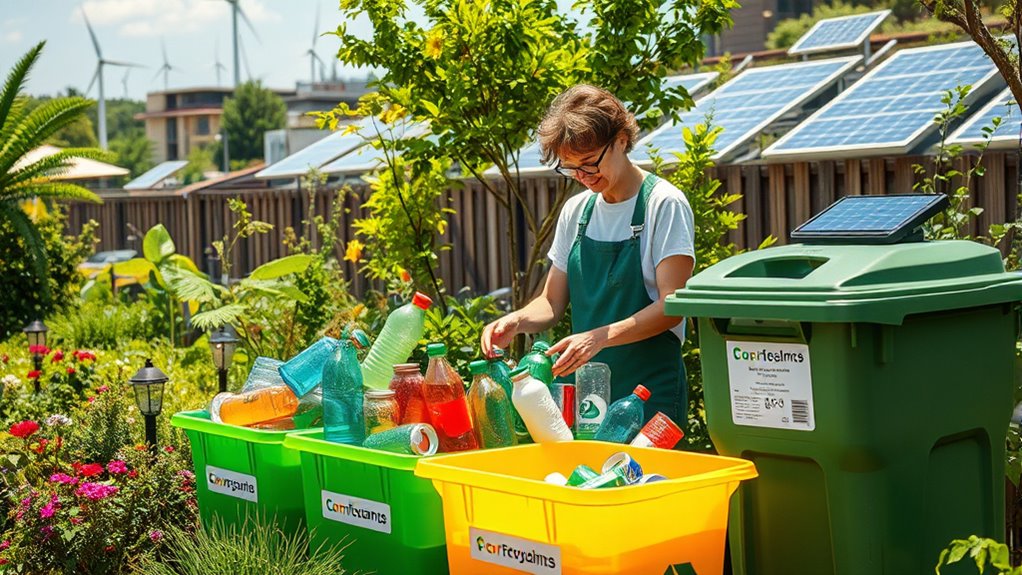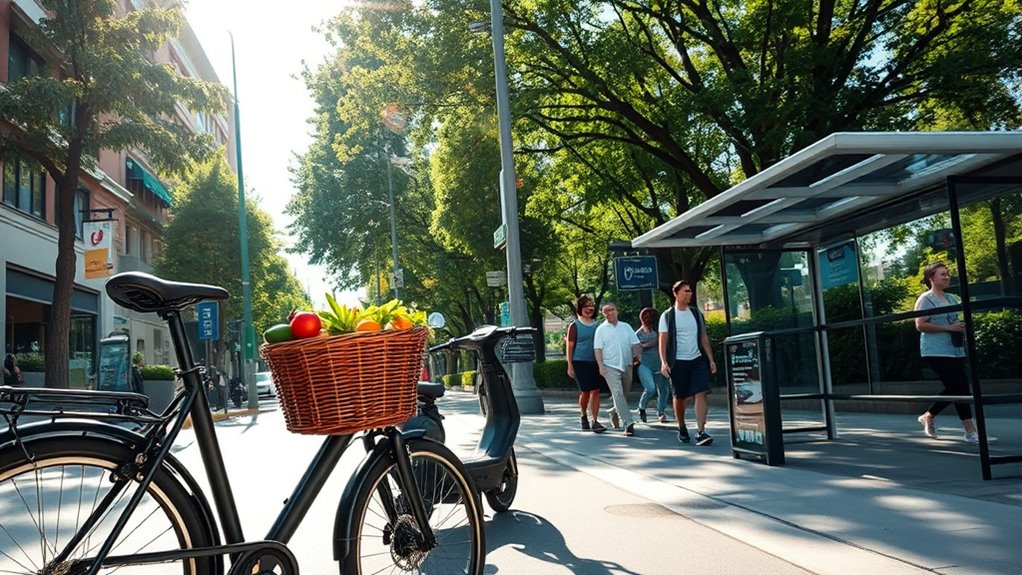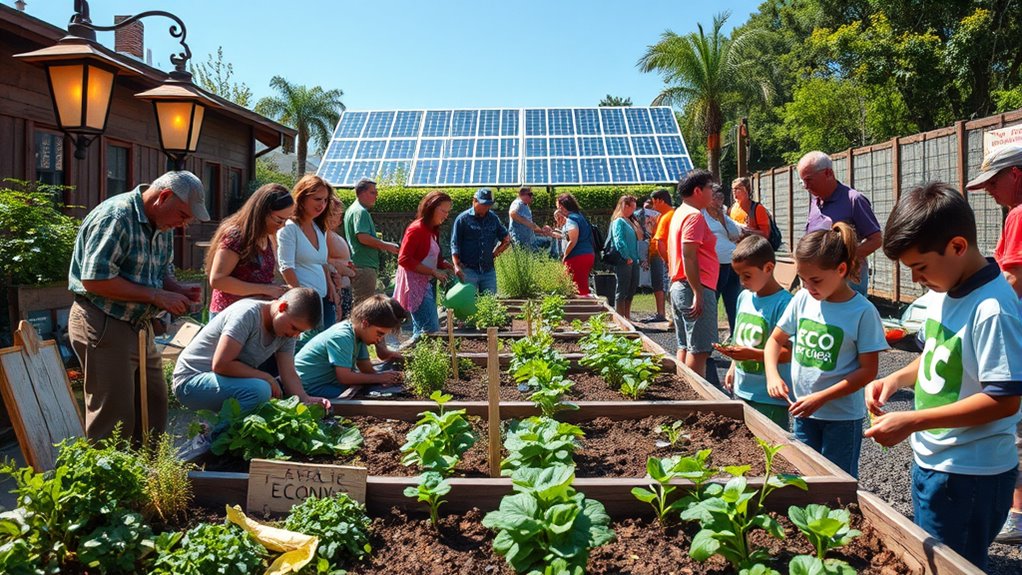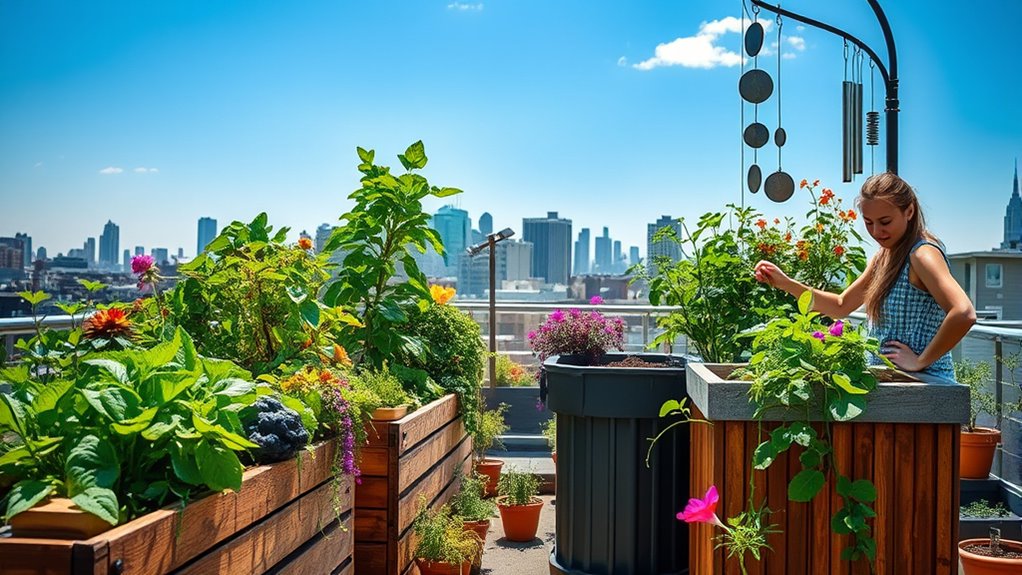To live sustainably and support a healthier planet, focus on reducing waste by recycling and composting, conserve water and energy at home with efficient appliances, and choose eco-friendly transportation like biking or public transit. Support local, plant-based foods and sustainable brands, then contribute to your community by planting native species and promoting green spaces. If you want practical tips and ways to make a real difference, explore more ways to integrate these habits into your life.
Key Takeaways
- Reduce waste by recycling, composting, and using reusable products to minimize landfill impact.
- Conserve water and energy through efficient appliances, leak repairs, and renewable energy sources like solar power.
- Choose sustainable transportation options such as walking, biking, public transit, and electric vehicles to lower carbon emissions.
- Support local, seasonal, and plant-based foods to promote regional economies and reduce environmental footprints.
- Engage community efforts like green spaces, biodiversity projects, and educational initiatives to foster collective sustainability.
Reducing Waste and Embracing Recycling

Have you ever considered how much waste you generate daily? It’s easy to overlook, but your habits directly impact the environment. Start by minimizing single-use items like plastic bags, bottles, and packaging. Switch to reusable alternatives—think cloth bags, metal bottles, and glass containers. Recycling is equally important; separate your waste carefully to ensure recyclables don’t end up in landfills. Educate yourself on local recycling guidelines so you can contribute effectively. Compost food scraps and yard waste to reduce trash and create nutrient-rich soil for your garden. Small changes add up: by reducing waste and embracing recycling, you lessen landfill overflow, save resources, and lower pollution. Your mindful actions make a difference for the planet’s health and future. Incorporating waste management practices and mindful decluttering practices can further help you identify excess items and reduce unnecessary waste, supporting your sustainability goals. Additionally, understanding sustainable consumption can guide you toward making more eco-friendly choices in your daily life. Practicing emotional awareness can also help you recognize habits that lead to unnecessary waste or overconsumption, fostering more mindful behaviors.
Conserving Water and Energy at Home

You can start saving water and energy today by using appliances efficiently and choosing models with high energy ratings. Implementing water-saving techniques like fixing leaks and installing low-flow fixtures makes a big difference. Smart energy solutions, such as programmable thermostats and solar panels, help reduce your overall consumption and costs. Additionally, selecting heat pumps with quiet operation features can improve your indoor comfort without increasing noise pollution. Incorporating energy-efficient appliances further enhances your efforts to conserve resources while maintaining household comfort. Using Gold IRA options for retirement planning can diversify your investment portfolio and contribute to your financial security, supporting your long-term sustainability goals. Exploring renewable energy sources like wind or solar power can significantly decrease your carbon footprint and promote a more sustainable lifestyle. Choosing appliances that have safety features like auto shut-off can prevent accidents and save energy.
Efficient Appliance Use
Using appliances efficiently is one of the simplest ways to conserve both water and energy at home. You can cut down on utility bills and reduce your environmental impact by making small changes. For example, run dishwashers and laundry machines only when full, and opt for energy-efficient models. Unplug devices when not in use to prevent phantom energy drain. Use a microwave or toaster oven instead of a full-sized oven for smaller meals. Set your refrigerator to the ideal temperature to avoid excess energy consumption. Finally, clean filters regularly to keep appliances running smoothly. These simple steps help you save resources and extend the lifespan of your appliances, making your home more sustainable. Proper appliance maintenance not only enhances efficiency but also reduces the need for frequent replacements. Small actions add up to a big difference for the planet. Additionally, adopting a remote work lifestyle can further reduce your carbon footprint by decreasing commuting-related emissions. Embracing technology-driven efficiency in home appliances can also lead to significant energy savings over time. Incorporating energy-efficient appliances is a key step toward a more sustainable household. Moreover, choosing appliances with high-efficiency ratings ensures optimal performance while minimizing environmental impact.
Water-Saving Techniques
Did you know that small changes in your daily habits can considerably reduce water and energy use? Simple actions like turning off the tap while brushing your teeth or washing dishes can save gallons daily. Install low-flow showerheads and faucet aerators to cut water consumption without sacrificing performance. Fix leaks promptly; a dripping faucet can waste over 3,000 gallons annually. Opt for full loads in your dishwasher and laundry machines to maximize efficiency. Use a broom instead of a hose to clean driveways and sidewalks, saving both water and energy. Collect rainwater for outdoor plants, reducing the need for tap water. These small adjustments add up, lowering your utility bills and easing the strain on local water supplies. Sustainable habits make a big difference for the planet and your wallet.
Smart Energy Solutions
Implementing smart energy solutions at home not only enhances water and energy conservation efforts but also maximizes efficiency in everyday routines. By upgrading to smart thermostats, LED lighting, and energy-efficient appliances, you reduce waste and lower utility bills. Incorporate motion sensors to turn off lights automatically, and set devices to power down during inactivity. Use programmable timers for heating and cooling, ensuring energy isn’t wasted when you’re away. Monitoring systems help you track consumption, making adjustments easier. These solutions make sustainable living simple and effective, aligning eco-friendly choices with your daily habits. Regularly checking for expiration dates on appliances and devices can prevent unexpected malfunctions and optimize performance. Additionally, understanding the bias in AI outputs can help you make informed choices about your diet and health. Incorporating renewable energy sources like solar panels into your home can further reduce reliance on traditional power grids and lower your carbon footprint.
Choosing Sustainable Transportation Options

Choosing sustainable transportation options allows you to reduce your carbon footprint and contribute to a healthier environment. Walking or biking for short trips minimizes emissions and boosts your health. Whenever possible, opt for public transit like buses and trains, which move many people efficiently, lowering overall pollution. Carpooling with friends or colleagues also cuts down on individual emissions and saves money. If you need a vehicle, consider switching to an electric or hybrid car, which produce fewer emissions than traditional gas-powered cars. Planning your trips to combine errands reduces unnecessary driving. By making these choices, you not only help fight climate change but also enjoy cost savings and improved well-being. Every small step toward sustainable transportation adds up to a significant positive impact.
Supporting Eco-Friendly Products and Brands

Ever wondered how your purchasing choices can promote sustainability? Supporting eco-friendly products and brands allows you to make a positive impact on the environment. When you choose products made with sustainable materials or produced ethically, you help reduce waste and pollution. Look for certifications like Fair Trade, USDA Organic, or B Corp to identify trustworthy brands. Prioritize local businesses to lower carbon footprints associated with shipping. Research brands’ commitments to environmental practices to ensure they align with your values. By consciously selecting eco-friendly options, you encourage companies to adopt greener practices and create a ripple effect. Your choices matter—each purchase is an opportunity to support a healthier planet and a more sustainable future. Incorporating sustainable ingredient sourcing into your routine is an effective way to contribute to this cause.
Adopting Plant-Based and Local Diets

Switching to plant-based and local diets can substantially reduce your environmental impact by lowering greenhouse gas emissions and conserving resources. Supporting local farmers helps keep your community sustainable and boosts the local economy. Plus, these diets often provide better nutrition, giving you energy and health benefits you might not get otherwise.
Environmental Benefits of Plants
Adopting plant-based and local diets can considerably reduce your environmental impact by lowering greenhouse gas emissions and conserving resources. Plants require less water, land, and energy compared to animal-based foods. They also absorb CO₂ during growth, helping to combat climate change. By choosing local produce, you reduce transportation emissions and support sustainable farming practices. Additionally, plant-based diets promote biodiversity by decreasing habitat destruction caused by livestock farming. You’ll also minimize waste and pollution linked to large-scale meat production. Incorporating more plants into your diet not only benefits your health but also encourages eco-friendly practices. Making these choices empowers you to contribute directly to a healthier planet while enjoying fresh, nutrient-rich foods.
- Consume seasonal, local produce for maximum environmental benefit
- Reduce reliance on processed and packaged foods
- Support farms practicing sustainable, eco-friendly methods
- Decrease food waste with mindful shopping and storage
- Promote biodiversity by choosing diverse plant-based options
Supporting Local Farmers
Supporting local farmers by choosing plant-based options from nearby sources amplifies the environmental benefits of your diet. When you buy locally, you reduce the carbon footprint associated with long-distance transportation and storage. This means fewer greenhouse gas emissions and less energy use. Additionally, supporting regional farmers helps sustain local economies, keeping money within your community. By opting for seasonal, plant-based foods from nearby farms, you encourage sustainable farming practices that prioritize soil health and biodiversity. Your choices can motivate farmers to adopt eco-friendly methods, benefiting the environment further. Plus, fresher produce often tastes better and retains more nutrients. Overall, supporting local, plant-based foods aligns your eating habits with your values of environmental stewardship and community support.
Nutritional Advantages of Plant-Based Diets
Choosing a plant-based diet, especially when sourced locally, offers significant nutritional benefits that can enhance your overall health. You’ll get plenty of fiber, vitamins, and antioxidants that support your immune system and digestion. Plant foods are naturally low in saturated fat and cholesterol, helping reduce heart disease risk. Plus, they provide essential nutrients like potassium, magnesium, and folate, which contribute to better blood pressure and energy levels. When you focus on local sources, the produce is fresher, retains more nutrients, and is free from unnecessary preservatives. Adopting a plant-based, local diet can also improve gut health and lower inflammation.
- Rich in fiber for digestive health
- Packed with antioxidants to fight free radicals
- Lower saturated fat intake
- Boosts immune function with vitamins
- Supports heart health
Creating Green Spaces and Promoting Biodiversity

Creating green spaces within urban environments offers an essential way to boost biodiversity and enhance community well-being. By planting native trees, shrubs, and flowers, you create habitats for birds, insects, and small mammals, supporting local ecosystems. These spaces also provide refuge for pollinators, which are crucial for healthy plant growth. Incorporate community gardens, parks, or even rooftop green areas to maximize benefits. When you promote biodiversity, you help sustain ecological balance and improve air quality. Green spaces also encourage outdoor activity, reduce stress, and foster social connections. Your efforts in creating and maintaining these areas contribute directly to a healthier planet and more resilient communities. Small actions, like planting a few native species, make a meaningful impact on urban biodiversity.
Educating and Engaging Your Community

How can you effectively educate and engage your community in sustainable living practices? Start by sharing simple, actionable tips through social media, community events, or workshops. Encourage participation by making it fun and relevant to their daily lives. Use storytelling to highlight local success stories, inspiring others to join the movement. Collaborate with local organizations to amplify your message and create a sense of collective effort. Offer hands-on experiences like community clean-ups or gardening days, which build a sense of ownership and pride. Additionally, provide resources such as guides or flyers that people can reference later. By fostering open dialogue and emphasizing mutual benefits, you’ll motivate your community to adopt sustainable habits and help create a healthier planet for everyone.
Engage your community with local success stories, hands-on activities, and collaborative efforts to promote sustainable living.
- Share success stories and local examples
- Host workshops or community events
- Use social media to spread awareness
- Organize hands-on activities
- Provide easy-to-understand resources
Frequently Asked Questions
How Can I Start Living More Sustainably on a Tight Budget?
You’re wondering how to start living more sustainably on a tight budget. First, cut costs by reducing waste—use reusable bags, bottles, and containers. Buy secondhand clothes and furniture, and prioritize energy-saving habits like turning off unused electronics. Grow your own herbs or vegetables if possible. Simple changes like these save money and help the environment, making sustainability achievable without overspending. Small steps lead to big impacts over time.
What Are the Best Ways to Influence Others to Adopt Eco-Friendly Habits?
You can influence others by leading with your actions, showing them how easy and rewarding eco-friendly habits are. Share your experiences and benefits, like saving money or feeling healthier, to inspire them. Offer practical tips tailored to their lifestyle, and encourage small steps. Be patient and positive, celebrating progress. Your enthusiasm and genuine example can motivate others to adopt greener habits naturally.
How Do I Handle Eco-Anxiety and Stay Motivated?
You might feel overwhelmed by eco-anxiety, but remember, focusing on what you can control helps. Take small steps, like reducing waste or conserving energy, to stay motivated. Connect with others who share your concerns, which boosts your confidence and resilience. Practice mindfulness or deep breathing to manage stress. Celebrating your progress keeps you inspired. By staying proactive, you turn anxiety into positive action, making a difference for yourself and the planet.
Can Small Daily Changes Make a Significant Environmental Impact?
Like the ripple of a stone thrown into a pond, small daily changes can create waves of impact. Your simple actions—reducing waste, conserving energy, choosing sustainable products—may seem minor, but they add up over time. By staying consistent, you become part of a larger movement. These tiny steps, multiplied by millions, can profoundly influence the environment, proving that even small efforts matter in the grand scheme.
What Are Emerging Sustainable Technologies to Watch for in the Future?
You’re curious about emerging sustainable technologies to watch. In the future, expect innovations like advanced solar panels with higher efficiencies, biodegradable materials replacing plastics, and smart energy systems that optimize power use. Electric vehicles will become more affordable and widespread, while carbon capture tech will help reduce greenhouse gases. Keep an eye on these breakthroughs—they’ll shape a greener, more sustainable world and help you lower your environmental footprint effectively.
Conclusion
So, here’s the irony: while it’s tempting to think small changes won’t make a difference, your daily choices actually shape the planet’s future. By recycling, conserving water, and supporting eco-friendly brands, you’re doing more than just greenwashing — you’re actively making a difference. Who knew that living sustainably isn’t about grand gestures, but about the little things you do every day? Turns out, being eco-friendly is the easiest way to save the world — and yourself.










